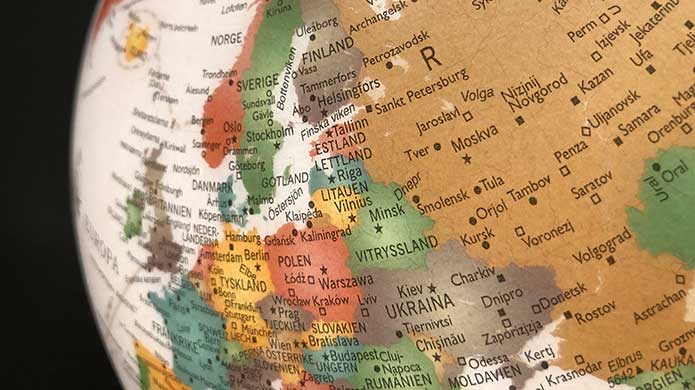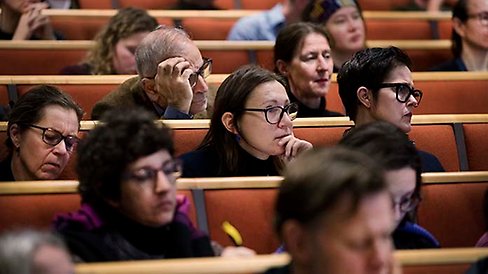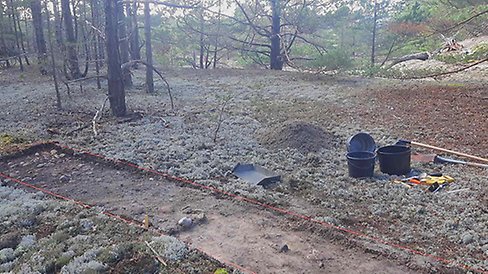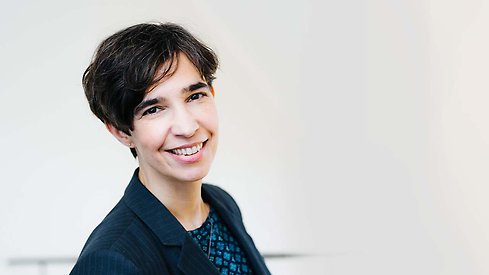Researcher on Russian propaganda: “Russia wants to undermine Ukraine’s sovereignty”
For more than two decades, Russia has tried to break down Ukraine’s political and economic systems. The aim is to create division and uncertainty through the use of extremely well-orchestrated propaganda campaigns. Alyona Hurkivska’s research examines Russian propaganda in Ukraine from 2014 onwards. She is now based at Södertörn University, as one of five visiting researchers participating in a programme run by the Foundation for Baltic and East European Studies for researchers at risk.

“In my research, I can see how Russia primarily concentrates on current issues that are being discussed in Ukrainian society. It is trying to create divisions and conflicts between different regions and within the population. For example, on the issue of the Russian language’s status in Ukraine, Russia is saying that new legislation is nationalistic,” says Alyona Hurkivska, doctoral student in Political Science at the Kuras Institute of Political and Ethnic Studies.
Her background is in Ukrainian public administration and, given her great interest in Ukrainian politics, her choice of research subject was never in question.
“Ukraine has fought for its freedom for more than 300 years and ever since we gained sovereignty after the fall of the Soviet Union in 1991, Russia has tried various ways of undermining this,” she says.
Networks and social media
To reach ordinary citizens with its propaganda, Russia often uses networks of pro-Russian interests in Ukraine, or social media platforms such as Telegram. For example, it has paid people in Ukraine to spread a narrative established by Russia. It also has an extensive intelligence network in Ukraine. Sometimes they work openly, sometimes not, Hurkivska says.
“Unfortunately, Ukraine lacks a stable system for demanding responsibility for these types of actions. The work of the security services has improved, but nepotism and other factors make it difficult to get those responsible to answer for their actions.”
She also describes how television channels with Russian owners, often friends of Putin, are used to spread disinformation and lies. They were among the first to spread untruths, such as Ukraine being on the way to losing its sovereignty to the West, that the country would be led by the EU and that Ukraine was completely disinterested in peace in the east of the country. They even said that Crimea was not annexed, that it was just given to Russia by Ukrainian authorities.
“It’s a terrible narrative. Ukraine’s president, Volodymyr Zelenskiy, signed an ordinance that closed down the channels, but propaganda is still being spread in other ways. A review conducted by a non-state-owned Ukrainian organisation shows how so-called “political experts” spread disinformation in news broadcasts for payment. There is one pro-Russian blogger who paints a picture of his party having many more sympathisers that it actually does,” says Hurkivska.
It is a well-worn trick, using false opinion polls to try to make a political party appear legitimate. This makes voters feel it is okay to vote for that party. But it can also deal with how events are described, the choice of words.
“After the revolution in February 2014 (Revolution of Dignity), in which the then-president Viktor Yanukovych was ousted, Ukraine started approaching the EU. The reforms were not ideal, but were a step in the right direction. However, Russian television called the people who participated rebels and Nazis, and called the new government the ‘Kiev regime’,” she says.
Other people’s values
Hurkivska says extensive longitudinal sociological surveys are necessary to uncover the exact scope of Russian attempts to sow division.
“Saying that, it is difficult to change people’s basic values even if propaganda, in the long term, can change someone’s views or opinions. But in the short term, it is not possible. The purpose of Russian propaganda is more to create divisions in society, to remove people’s trust in authorities and to depersonalise other people. They often target people in conflict areas, where recipients are vulnerable. These are found throughout the country, but particularly in occupied areas such as Crimea and Donbas, or in regions that Russia wants to occupy in the first term, such as Odessa, Kherson and Kharkiv.
The role of a researcher
It is not unusual for research interests to be close to those that are personal to researchers, but she has not found differentiating between Alyona the researcher and Alyona the private person to be difficult.
“With my background, I am used to following particular guidelines when working on political texts. Being objective is not a problem, because identifying propaganda is not difficult. You see it, check it and expose it for what it is. In my research, I want to show how structured, multifaceted and well executed this aggressive and misleading information is. I’m investigating material from 2014 onwards, which means that it also covers the time prior to the full-scale invasion, and am trying to get the reader to realise that what is happening is not by chance, but is part of a comprehensive strategy against Ukraine and against liberal and democratic European values,” she concludes.
Page updated
16-02-2023





